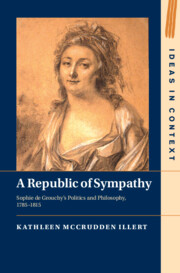Book contents
- A Republic of Sympathy
- Ideas In Context
- A Republic of Sympathy
- Copyright page
- Dedication
- Contents
- Acknowledgements
- Abbreviations
- Introduction
- Chapter 1 The Letters, 1786
- Chapter 2 The Wheel, 1785–1789
- Chapter 3 The Revolution, 1789–1793
- Chapter 4 The Republic, 1791–1793
- Chapter 5 The Publication, 1794–1799
- Chapter 6 The Mask, 1799–1804
- Chapter 7 The Poet, 1804–1810
- Chapter 8 The Thread, 1798–1815
- Conclusion
- Appendix: Attributions
- Bibliography
- Index
Chapter 8 - The Thread, 1798–1815
Published online by Cambridge University Press: 18 December 2024
- A Republic of Sympathy
- Ideas In Context
- A Republic of Sympathy
- Copyright page
- Dedication
- Contents
- Acknowledgements
- Abbreviations
- Introduction
- Chapter 1 The Letters, 1786
- Chapter 2 The Wheel, 1785–1789
- Chapter 3 The Revolution, 1789–1793
- Chapter 4 The Republic, 1791–1793
- Chapter 5 The Publication, 1794–1799
- Chapter 6 The Mask, 1799–1804
- Chapter 7 The Poet, 1804–1810
- Chapter 8 The Thread, 1798–1815
- Conclusion
- Appendix: Attributions
- Bibliography
- Index
Summary
The final Chapter argues that Grouchy should be seen as a red thread that ties eighteenth-century to nineteenth-century thought. She allows us to see the ideas that emerged following the Revolution not as a caesura, but as a continuation of earlier preoccupations. Using the example of Benjamin Constant, who was a close friend and interlocutor with Grouchy, it argues that the stress placed by Constant and others on the political importance of sympathy was not a Romantic rejection of Enlightenment rationalism, but the perpetuation of an eighteenth-century grappling with how sentiments could be combined with reason to act as a means of uniting the individual and the community, and therefore as a foundation for political society. In the case of Constant, Grouchy was a significant conduit for these ideas. The Chapter explores how many of Constant’s major texts of the period 1800–1815 engaged in various ways with Grouchy’s concept of ‘particular sympathy’, and the potential threat that it poses to the proper development of moral ideas. It suggests, moreover, that Constant’s idea of ‘religious sentiment’ was an alternative solution to the problem posed by particular sympathy, equivalent to Grouchy’s turn to aesthetic philosophy.
Keywords
- Type
- Chapter
- Information
- A Republic of SympathySophie de Grouchy's Politics and Philosophy, 1785–1815, pp. 203 - 223Publisher: Cambridge University PressPrint publication year: 2024

